We join third year BSc (Hons) Live Sound students Skye Walters and Hazel Warren-Cooke to discuss the realities of being a marginalised individual in the live sound industry, the challenges they've faced and why gender needs to stop being part of the conversation.
The audio industry may still be heavily dominated by men, but more and more women, non-binary and trans individuals are following their dreams of working in the audio industry. What's more, the language and perception surrounding non-male professionals is making positive progress - but there's still a lot of work to be done.
Though no less prevalent, the challenges that marginalised individuals face when training to work in live sound specifically are somewhat different to those for studio engineers, producers, composers and artists. To better understand the realities of training and working in this area of the industry as a non-male, we sat down with Skye Walters (she/her) and Hazel Warren-Cooke (they/her) for their insight and unique perspective.
Choosing live sound
For Skye and Hazel, their interest in sound and music began with a musical instrument; Skye was classically trained on piano while Hazel learned acoustic guitar. This was merely the gateway, and over the years both slowly discovered the world of live sound and realised this was the path for them.
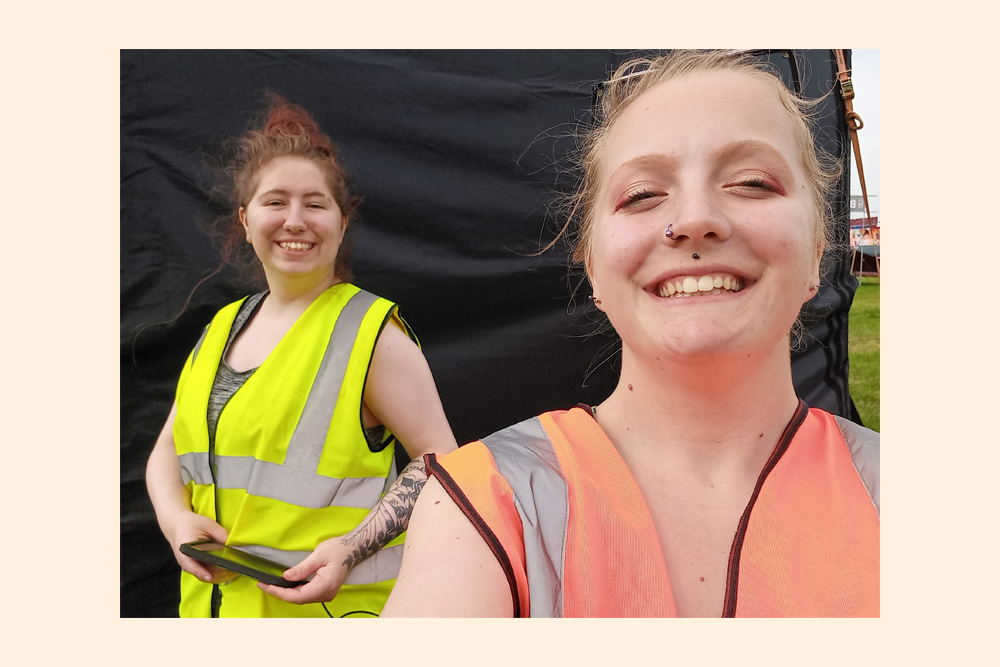
Hazel (left) and Skye (right) at Summer of Love festival
Now in the last semester of their final year at dBs, Skye and Hazel are already firmly rooted within the live sound scene. Working regularly within their respective roles of monitor engineer and FoH engineer, they are primed - if a little anxious - about life as full-time audio professionals. While their roles are different, the reason they love what they do is universal.
Skye: "We're a bunch of really vain introverts and I mean that in the nicest way! We want to feel important and play a really big role in what's making this experience so good, but none of us want to get on that stage. For me personally, it's that gratification and knowing that you've made that person sound amazing, and they couldn't do it without you."
Hazel: "Yeah, you know you're a vital part of the show."
Skye and Hazel's experience in the industry has been varied and far-reaching; working at festivals, in venues, for manufacturers, on tours and at dBs-hosted events. Thanks to the dedication of the teaching team on the BSc Live Sound course, it boasts one of the highest employment rates in dBs, yet this doesn't nullify the challenges of being a non-male in this industry.
Hazel: "Before dBs, my live sound experience was limited to helping out at my sister's theatre company, Coppice Theatre in Cornwall. I was mainly just hitting the spacebar to play different cues."
.jpg?width=350&name=Skye%20lying%20down%20on%20a%20foldback%20speaker%20(small).jpg) Skye: "My experience was pretty similar. I worked in a little theatre in my parents' village in Cornwall. I basically sat in front of Audacity and pressed space to record and occasionally I would press mute on a microphone. That was my first live sound job.
Skye: "My experience was pretty similar. I worked in a little theatre in my parents' village in Cornwall. I basically sat in front of Audacity and pressed space to record and occasionally I would press mute on a microphone. That was my first live sound job.
"I think it's really important to take those kinds of jobs, especially as non-males in the industry; it's a lot harder to get in. Our tutor, Fiona [Riches] said to me before it's about making the nearest man think that you're his best friend a lot of the time. Unfortunately, that is a little bit of a different experience for the male students compared to the non-male students. A lot of the guys on our course will say, 'I've got a job with this guy'. And we're like, 'how!?' And it's usually just from chatting to him."
Hazel: "It's harder to build the same rapport, I think."
The way in which their male counterparts easily slot in is not limited to professional networking either, and was something that Skye and Hazel noticed from their very first day upon starting the course.
Hazel: "It's so easy to blend into the background. I see it as a minor thing, but on the day of induction, Skye was sitting next to me and she was talking to Tom [Chitson] about the equipment that was coming up from Plymouth. I had no idea what any of it was, it was just numbers and letters. My first instinct was that Skye was my competition because she was the only other woman."
Skye: "Yeah, I felt exactly the same - I totally understand that."
Hazel: "The moment we left the room and started walking out, all the guys had already accumulated into one mass outside. And Skye was standing there with me, and I just thought, she could be my competition or my best ally. We didn't even know each other, why am I going to start off hating her?"
Skye: "It's really easy to fall into jealousy like that."
Hazel: "Yeah, you definitely look at who's on par with you, who's the other person like me in the room and how do I compare to them? I would have had such a hard time on the course if I was the only woman because all the guys just amassed into one person."
Challenging perceptions
Skye and Hazel certainly didn't alienate themselves from the male students in their class, and everyone in their class is hugely supportive of each other.
Skye: "It's really nice in our third year, because we're finding that we all fit into very specific roles. There's only less than 10 of us in the group, so when we all go to work on a show together it's like a well oiled machine.
Hazel: "Because the class is so small we all know each other so well, too."
Skye: "Exactly, and we share opportunities with each other. If someone is offered a job that they can't commit to, we have a group chat and they ask if any of us can take it instead."
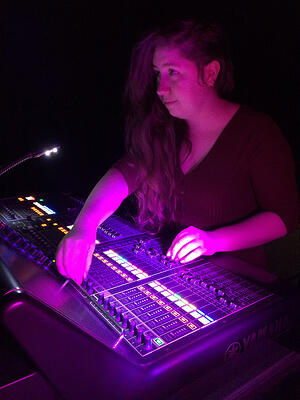 Despite possessing hundreds - if not thousands - of hours of industry experience between them, and having a great support network amongst their classmates, Skye and Hazel are still plagued by the outdated perception of what a live sound engineer looks like.
Despite possessing hundreds - if not thousands - of hours of industry experience between them, and having a great support network amongst their classmates, Skye and Hazel are still plagued by the outdated perception of what a live sound engineer looks like.
Skye: "A high proportion of the professionals working in live sound are tall, bearded men and that's what people tend to look for when they're looking for the sound engineer. When I'm working a show, I have to make sure I'm the first to say hi to the artist because I've noticed that if I don't, I tend to go spoken to through someone else, and I can't stand that. I'm here to do my job, so talk to me about my job. This is definitely occurring less frequently, and the engineer will often say, 'Skye's your monitor engineer, go ask her', but there's still a small portion of people that hear that, look at me and still ask, 'are you though?'
"I was working at an event not that long ago and I hadn't been given my wristband yet and was refused access to one of the stages by security. I said that I was on the sound team and their response was, 'I've never seen a woman sound engineer, you're probably just a groupie trying to get backstage.'"
Beyond the surface level issues surrounding perception, they both face a challenge that is frequently overlooked.
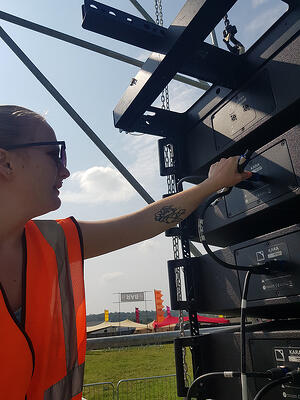 Skye: "I'm 4'10 and weigh 60kg. Some of the speakers that I'm working with weigh 50kg, so there's a very real concern that I could hurt myself trying to move this equipment. On the occasions where the job requires me to do this, I might have to then look at bringing along someone to help me, but then the venue/promoter has to pay two people where they could just pay a man to do it themselves.
Skye: "I'm 4'10 and weigh 60kg. Some of the speakers that I'm working with weigh 50kg, so there's a very real concern that I could hurt myself trying to move this equipment. On the occasions where the job requires me to do this, I might have to then look at bringing along someone to help me, but then the venue/promoter has to pay two people where they could just pay a man to do it themselves.
"I will always make accommodations for myself and I never expect an employer to make accommodations for me, but I'm self-employed - it's my responsibility to make sure I can do the job. At the same time, I have this mentality where it will be seen as a negative if I have to ask a man to help me move something that's too heavy.
Hazel: "It's the same for me, but I also have underlying health conditions. I have low blood pressure and I get dizzy really easily, especially when exerting myself physically. There are things I can reasonably lift, it might be heavy and take me a little longer, but I can do it. Afterwards, I have to sit down for five minutes to catch my breath and because I'm not a guy, there's definitely a skewed perception on how capable I am."
Knowing your worth
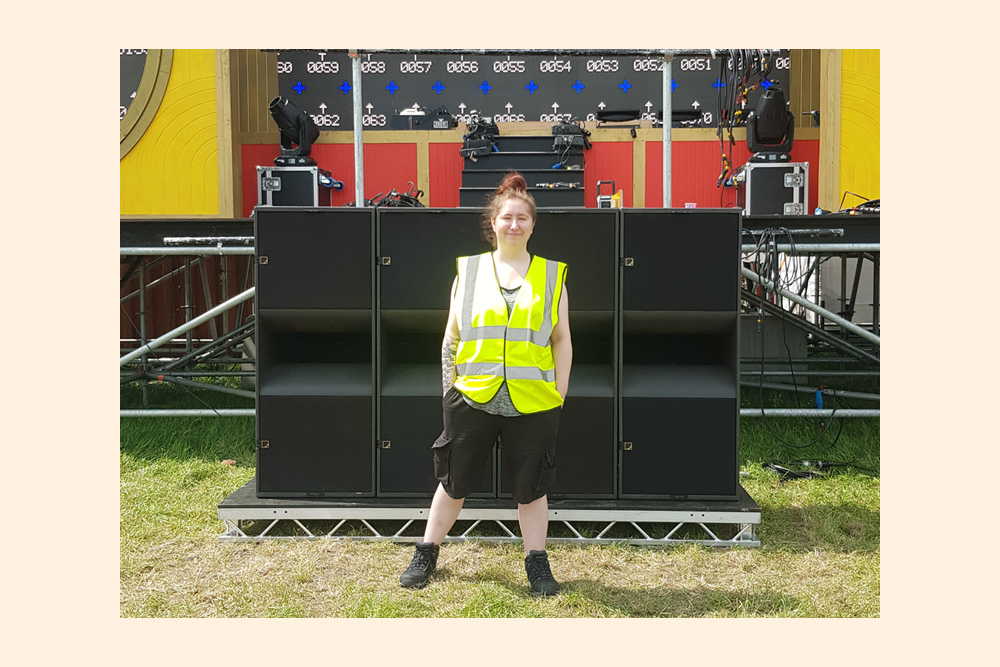
Through hard work, dedication and the support from their tutors, Skye and Hazel are in a great position ahead of graduation. Yet the nature of the live sound industry dictates that 90% of professionals will be freelancers and that means - amongst many things - setting your rates; an already difficult task that's magnified when trying to prove yourself in a male-dominated industry.
Skye: "Everybody has to work for free for a certain period of time in the music industry, especially when you're starting out, because it's the best way to get your feet underneath you. You shadow people, you bother people, you go to festivals for free, carry cables, you make cups of tea, but you reach a point where you have to say, 'No, I'm not doing it for free anymore. I'm worth this much.' It's a really hard thing to quantify; the imposter syndrome is horrific."
Hazel: "Negotiating is a really tricky thing. There's the imposter syndrome and wondering if you're really technically advanced enough to be paid for what you're doing, but for us there's also the feeling that you need to work even harder. There's potentially a huge number of men in the industry that can already do this job better than me, so you have to work extremely hard to prove that you're not just good, you're really good."
Skye: "I am getting better. I'm at the point now where if I'm asked if I can do a job, I will say, "Yes, here's my rate. Do you need to negotiate?' I think it's really important to put the onus on them rather than yourself. It's all about setting boundaries."
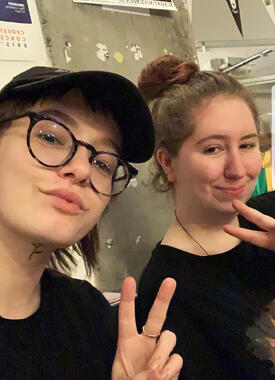 In the time leading up to studying at dBs, Skye and Hazel both had limited experience learning from non-male professionals. For them, a real turning point was the addition of Fiona to the teaching team in 2021.
In the time leading up to studying at dBs, Skye and Hazel both had limited experience learning from non-male professionals. For them, a real turning point was the addition of Fiona to the teaching team in 2021.
Hazel: "Having Fiona as a tutor has had a massive impact for us. To see somebody who's built a large, extended career and has gone through so much, handled it so well and still stayed true to themselves is really inspiring. They also offer a bit of energy, which you don't always get from a male perspective.
Skye: "Fiona is very good about sharing their experiences, not hiding that it happens, not hiding how they would deal with it, and the fact that it hurts, because it does. They definitely provide a perspective that our male lecturers have never been able to provide and that's through no fault of their own, they've just never experienced it."
Moving in the right direction
The positive impact of Fiona's presence on the teaching team is not exclusive to Skye and Hazel, and their fresh perspective has started to affect great changes amongst the students and tutors.
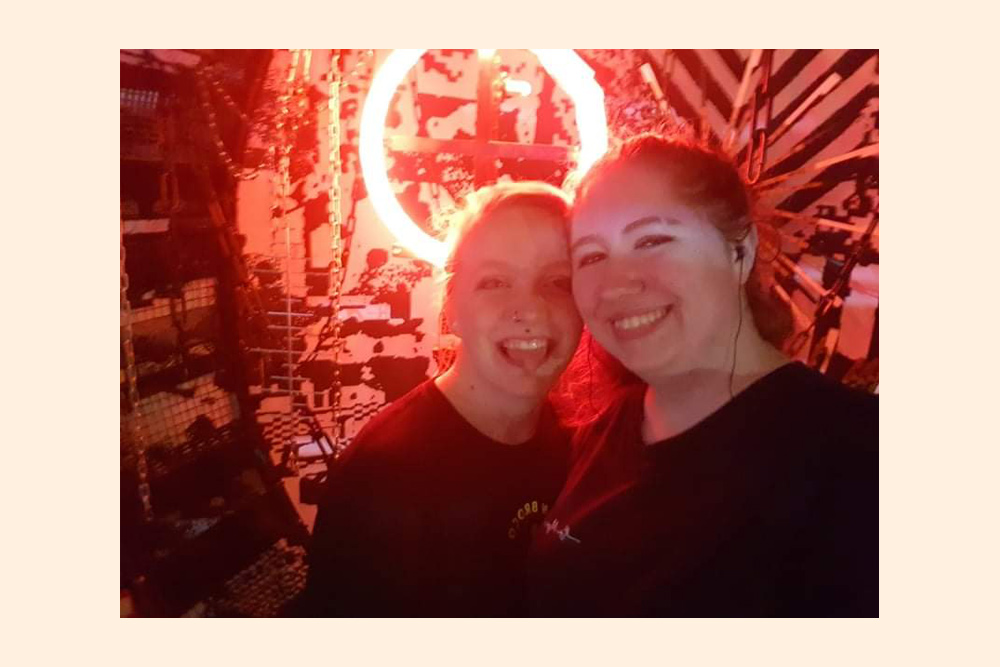
Skye and Hazel from behind the sound desk at the dBs Freshers' event at Strange Brew
Skye: "Because Fiona advocates for themselves so well, there's been a lot of change in mannerisms and language used in our classes. Hazel and I can't necessarily advocate for ourselves because they're our peers, so seeing every one of the guys in the room, student or tutor, making a real conscious effort to correct themselves if they misgender someone is really encouraging. It's introduced them to a new perspective that they wouldn't have experienced in the industry before."
Progress isn't just being made in the classroom either. Equality within the music industry may be some 10 years behind other industries, but positive changes are taking place.
Skye: "I've personally noticed in the wider industry that people are changing the way that they joke and they don't direct inappropriate comments at me. I've seen male colleagues pull up others on certain comments or jokes and say, 'that's not funny. Why did you say that?' It's great to see that cognition and people taking steps to correct themselves rather than putting pressure on the people affected by it."
While a shift in attitude and understanding is becoming more prevalent across the industry, Hazel points out that there's still a topic that rarely gets acknowledged by the male professionals in the industry.
Hazel: "Safety is a huge thing that never seems to be talked about in the industry. We work late hours and night shifts are fairly common, so making sure we can get home safely is important and takes a lot of consideration, which adds additional stress to the job.
"I remember watching Fiona's guest lecture before they started teaching at dBs and it stuck out to me because that was the first time I had ever heard anyone in the industry talk about women's/non-men's safety after work. It was both refreshing and concerning to experience that, as it led to the question, 'why doesn't anyone talk about this?'. The answer is, of course, because the industry is male-dominated. It's less of a concern for them and probably not a daily consideration, and when non-men in the industry already have to consider the steps needed to be safe, it's basically unspoken.
"If male tutors, peers, colleagues, employees and employers actively engaged in these channels of conversation more frequently, it would feel less like a one (wo)man battle. That also comes back to what Skye said about the men we know making sure to hold each other accountable for their comments and jokes. It makes me feel safer and stronger to know that the people around me are considerate of my safety because it makes me feel like its less about me and my gender and more about the problem itself.
"Tom (Chitson) does a great job of caring for all of his students, making sure we all have methods of getting home safely. He made sure I have lights for my bike so I can cycle home in the dark; something so incredibly simple but profoundly meaningful and reassuring."
Outside of the safety of non-male individuals working in live sound, I ask Skye and Hazel where the industry needs to improve and it's at this point that I become very aware of my own ignorance. Some of my questions have fixated on how they've been treated because of their gender, key female role models etc. and it highlights the bigger issue at play here: in order to move forward, we have to stop bringing gender into the equation.
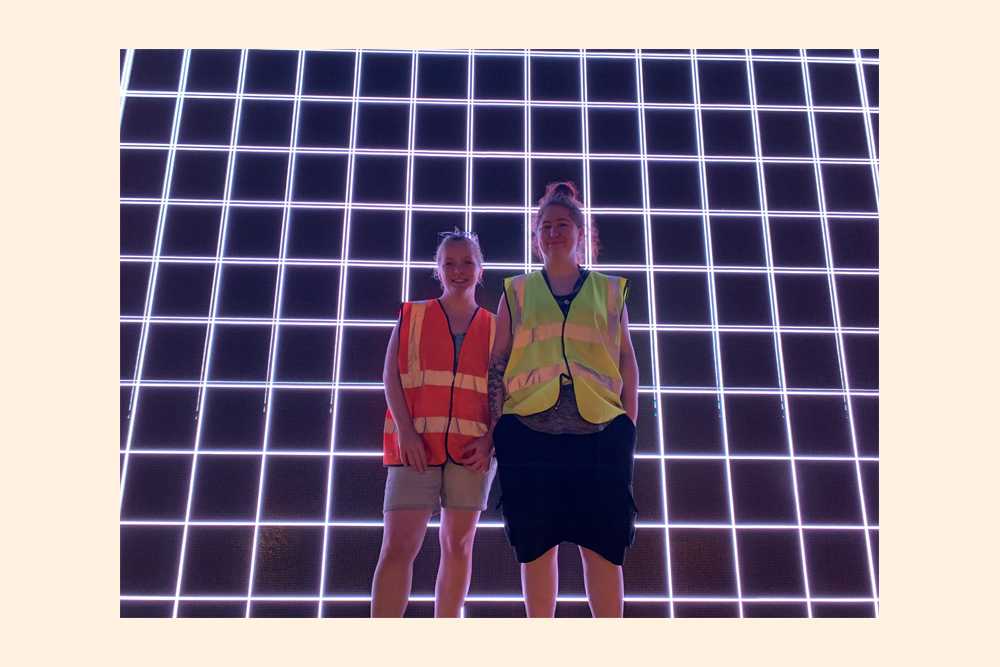
Skye: "Marginalised genders are still being treated in a very tokenistic way. I have been employed purely because I'm a woman, and the promoter had an equality quota to fill. They didn't ask for my CV or anything. It was nice to be asked, but it actually resulted in a very panic-inducing gig because I was unfamiliar with all their kit. I wish there had been more discussion on the venue's part rather than going, 'you're a woman, you can do it.'
"There needs to come a time when I don't have to classify myself as a female sound engineer, where I can just classify myself as a sound engineer. For me, feminism is about equality, not about raising women above men and I think that's what the industry needs to achieve."
Hazel: "Because you're a woman or a non-binary person and you are in an industry that is male-dominated, people make that a gender thing. It shouldn't be they're a female engineer, they're just an engineer. It's good intentions that go too far into becoming negative again."
Skye: "Those good intentions can definitely be misplaced and ultimately be damaging. I want you to recognise that I'm not a man. I want you to recognise that things are changing and to not completely ignore it. What I don't want you to have to say is, 'Oh, it's great to see a woman behind the mixing desk. Being female is part of my identity, it's part of who I am. That's not all I am."
FIND OUT MORE:
https://www.instagram.com/wildflower.audio/
https://sites.google.com/ghostsound.co.uk/ghost-sound/ghostsound
Do you live for the roar of the crowd and seeing a performer at their best?
Find out more about our BSc (Hons) Live Sound degree; it could be the perfect match for you.


